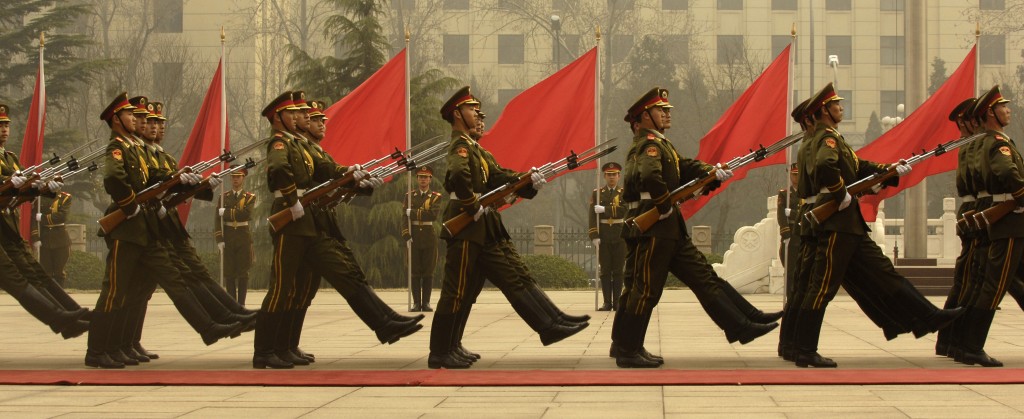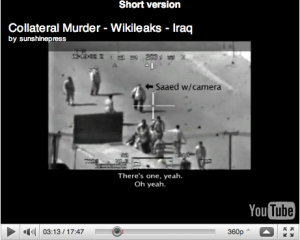 A year on and many thousands of leaked documents later, it’s easy to forget how Wikileaks first came to wide international attention. But a recent paper in Psychological Science brought the memory back to me with a sharpness and intensity out of all proportion with the grainy YouTube video at the incident’s core. The memory is unpleasant enough that I’m not even going to think about sharing it until after the jump.
A year on and many thousands of leaked documents later, it’s easy to forget how Wikileaks first came to wide international attention. But a recent paper in Psychological Science brought the memory back to me with a sharpness and intensity out of all proportion with the grainy YouTube video at the incident’s core. The memory is unpleasant enough that I’m not even going to think about sharing it until after the jump.
Human beings are weird animals. You knew that of course—our constant self-evaluation, whether bemused or infatuated, is a key contributor to that weirdness—but I’m talking about something deeper than the whole hairless bipedalism situation. From a biological point of view, we have a profound contradiction running right through the psychological essence of our species.
On the one hand, human beings are profoundly social animals. Sure, we can survive for months or years in solitude of either the literal, desert island sort, or of the technologically mediated pornography-addiction-and-microwave-meals variety. But people who do almost invariably end up going squirrely, if they weren’t that way to start with. For the most part, we not only thrive in proportion with our family and social connections, but we are quick to cement them with the particular flavors of kindness and generosity that biologists call altruism, and the rest of us call not being a jerk.
But there’s another hand, and this one is grasping a club and bloodied to the elbow: we can also be astoundingly violent. Importantly, we’re not just impassively cruel to the creatures we eat—any predator can claim that. But unlike almost every other species known, we are floridly, intentionally, creatively—and lethally—cruel to members of our own species. We humans, in other words, may be lovers. But we are also, more than any other species, warriors.*
This duality has produced more than just the seemingly endless debate over whether humanity and our history are marked and defined by violence, or by altruism. It has produced a duality in our nature: we are, demonstrably, marked by both.
What is war? At its most basic, it is simply the willingness or ability to set out intentionally to kill members of your own species. It doesn’t take a Darwin to work out that this is a lousy way to ensure the survival of the species, or that some countervailing mechanism must be in place, since we haven’t yet slaughtered ourselves into extinction.
That mechanism is empathy; the manifestation is altruism. And the end result is that we are each of us capable of great acts of compassion and generosity to some—our “in group”—and brutal, casual violence to others—our “out group.” But here’s where it gets really interesting: we get to decide who falls into each group.
Evolutionarily, it would make great sense for a warring, social species such as ours to feel the most empathy for those most closely related to us, and the most enmity for those most genetically distant. But the dominant theme across the broad sweep of history—and in billions of individual lives—is the gradual expansion of the in-group. From family to clan, clan to tribe, tribe to nation and on … horrifying exceptions notwithstanding, it is readily apparent that our empathy can cross the boundaries of genetic and geographical connection, of race, of gender, and even of species.
Or torture. In their paper “What Constitutes Torture? Psychological Impediments to an Objective Evaluation of Enhanced Interrogation Tactics,” researchers studied attitudes toward solitary confinement in prisons. They subjected one group of volunteers to a mild version of social exclusion—in this case, being left out of an online ball-throwing game—then asked all volunteers whether they supported or opposed long-term solitary confinement in U.S. jails. The result is surprising only because of the mildness of the conditioning exercise: 63 percent of the volunteers who were excluded from the game opposed solitary confinement, while only a third of those who got to play expressed similar reservations.
Psychologists call this the empathy gap, but to my mind, it’s a switch: Turn it one way, and we love. Flip it the other, and compassion flicks out like a light. In the experiment above, empathy was switched on when a mild taste of social exclusion created a feeling of common experience or kinship with those subjected to more severe forms, making them better able to assess the impact of the harsher equivalent. To those so-conditioned, the unconditioned appear callous at best, if not downright evil.**
Which is what made me think of Wikileaks, and the cockpit video of an American helicopter crew talking calmly as they assess a group of individuals on the ground, consult with a support base, and flip the empathy switch to kill.
You can watch it if you want, but I wouldn’t really recommend it. The video is grisly—far too grisly for me to feel comfortable embedding it here—but not because it’s graphic. It isn’t. It’s grisly because it is casual, efficient and true. And because we so rarely see images of what happens when our empathy switches are turned all the way off.
I remember listening to a BBC radio call in show about the video, at the time, and hearing people from around the world expressing shock and horror that the Americans were so callous and cold as they killed—surely they must be monsters! But here’s what is truly horrifying: those men were nothing of the sort. They were simply human beings, operating under professional guidelines and with the preconditioning of military training—one of the primary goals of which is to intensify empathy for one’s comrades, and snuff it out entirely for whomever is designated “enemy.”
The leaked video, ultimately, was so effectively chilling because it at one time primed viewers’ empathy for the victims, while showing in visceral banality one of the least attractive emotional states human beings can achieve: the empathy gap, full force.
__
*By definition, that makes us rapists, torturers and slavers as well. But honestly? That’s too depressing for a Monday. I’d be happy to sell you a book if you’d like to find out why.
**The authors argue that judges and politicians assessing “enhanced interrogation” techniques should first be subjected to mild torture themselves. My only quibble is with the “mild.”
I remember being rooted to the spot with horror when I first saw that video. Still am. Humans are pretty weird.
Never mind it being Monday. They are always a nasty shade of brown and taste like bleach.
I wish we had the technology to “like” comments. Rosie, are you by any chance a dragon?
The chilling part of the video for me was the similarity of the tone of voice and expressions used by the helicopter pilots and gunners to those used by online gamers. Even down to their impatience.
May I suggest a further resources to learn more about empathy and compassion.
The Center for Building a Culture of Empathy
The Culture of Empathy website is the largest internet portal for resources and information about the values of empathy and compassion. It contains articles, conferences, definitions, experts, history, interviews, videos, science and much more about empathy and compassion.
http://CultureOfEmpathy.com
Also, we invite you to post a link to your article about empathy to our Empathy Center Facebook page.
http://Facebook.com/EmpathyCenter
Isn’t the trick to try and find ways of spring-loading the switch in the direction of empathy?
With a little awareness and training we can teach ourselves to be more empathetic, and narrow the empathy gap, if you will. Anyway, this is what I believe, and I’ve just bought Sex and War, and am hoping this is a conclusion. I suspect the book will be brilliant. I’m a fan. And a dragon.
That’s absolutely the trick, Tim. And it turns out that we’ve developed a lot of good ones over the years. It comes down to expanding one’s in-group, those with whom we have a fellow feeling. The most dramatic geopolitical example is probably the European Union, arising after centuries of war. On a personal level, the expansion of racial tolerance over the last 50 years has been pretty dramatic, too.
Snake, actually.